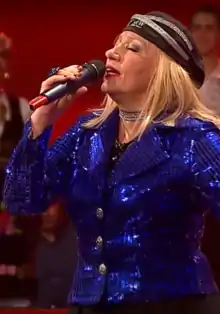Nada Topčagić
Nada Topčagić (Serbian Cyrillic: Нада Топчагић; born 3 July 1953) is a Serbian singer from Bosnia and Herzegovina.
Nada Topčagić Нада Топчагић | |
|---|---|
 Topčagić in 2018 | |
| Background information | |
| Birth name | Senada Topčagić |
| Born | 3 July 1953 Modriča, PR Bosnia and Herzegovina, FPR Yugoslavia |
| Genres | Folk |
| Occupation(s) | Singer |
| Years active | 1975–today |
Career
Her professional career began in 1975, with the release of her first single, "Na Drini ćuprija" (The Bridge on the Drina), written by Obren Pjevović. She was most popular during the 1980s although she has been active to date.
A month after the fall of Vukovar during the Croatian War of Independence, in the winter of 1991–92, she, Era Ojdanić and Mira Kosovka sung at a concert for Serb soldiers in the occupied city.[1][2] According to her, she was forced by armed soldiers to sing at the concert.[3]
In 2021, Swedish footballer Zlatan Ibrahimović used a snippet of her song "Jutro je" (It's Morning) at Sanremo Music Festival. The snippet subsequently achieved significant notoriety in Italy.
Personal life
Topčagić was born in Modriča, SR Bosnia and Herzegovina, Yugoslavia. She moved to Belgrade some time before the release of her first single (1975). Nada lives and works in Belgrade. She is married to Zlatko Đorđević, with whom she has a son, Miroslav (b. 1984).[4]
Discography
- Na Drini ćuprija (1975)
- Dva zlatna prstena (1976)
- Zaklanjaš mi Sunce (1977)
- Ja sam žena dvadesetog veka (1978)
- Dobro došo u moj život (1979)
- Život je lep dok si mlad (1979)
- Ja ne žalim oči svoje (1980)
- Ja sam tvoja i ničija više (1981)
- Treba mi rame tvoje (1982)
- Pomozi mi (1983)
- Zovem te, zovem (1984)
- Želim te, želim (1985)
- Nežno, nežnije (1987)
- Na srcu mi ležiš (1988)
- Volela sam koliko sam mogla (1989)
- Koju igru igraš (Jutro je) (1990)
- Sudba sirotana (1992)
- Ljubomorna sam (1995)
- Slobodna žena (1996)
- Ti nisi ništa kriv (1997)
- Dobro jutro pijanice (1998)
- Sanjala sam (2001)
- Od vikenda do vikenda (2004)
- Najveći hitovi (2008)
- Lomio me ovaj život (2020)
References
- "e-novine.com - Narodnjačko prelo za "oslobodioce"". Archived from the original on 21 November 2009.
- Catherine Baker (1 July 2010). Sounds of the Borderland: Popular Music, War and Nationalism in Croatia since 1991. Ashgate Publishing, Ltd. pp. 187–. ISBN 978-1-4094-9403-4.
- "Srpska estrada bojkotuje koncert Tereze Kesovije".
- "Nada Topčagić: Jedva čekam unuče" (in Serbian). 3 July 2011. Archived from the original on 2 December 2013. Retrieved 23 January 2020.